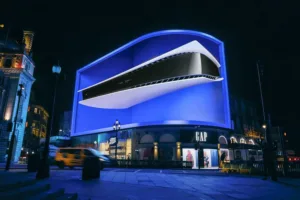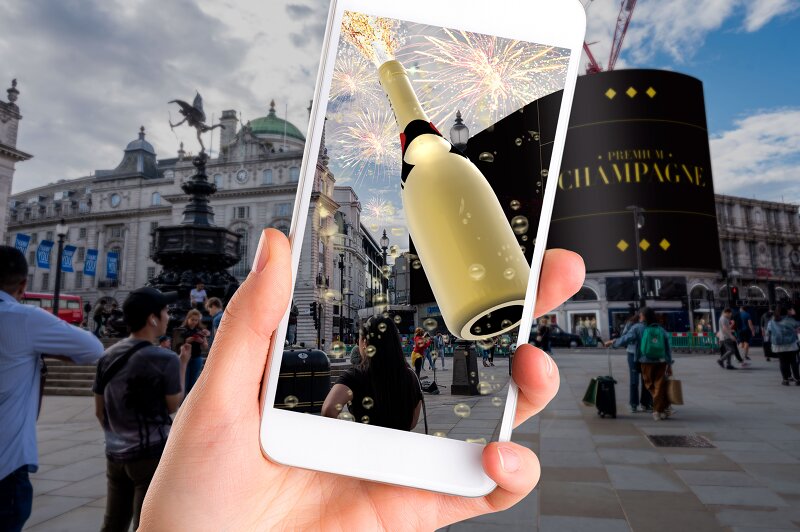Landsec, owner of the Piccadilly Lights, and Ocean Outdoor are testing advanced augmented reality (AR) technology which can connect the iconic screen to audiences and trigger spectacular interactive 3D experiences.
Developed in association with Darabase and delivered via their platform, the technology uses a range of techniques including a virtual model to replicate the sweep and scale of the Piccadilly screen to deliver large-scale mobile AR experiences which amplify the big screen content on a viewer’s mobile handset.
By connecting audiences to the screen via Piccadilly’s wifi network and 4G/5G networks, mobile AR allows individuals to see and play with dynamic, interactive 3D content which sits proud of and surrounds the screen.
For example, audiences can use their handsets to pop a cork from a 3D champagne bottle to release a flow of bubbles, activate a virtual fireworks display, or play interactive games such as throwing a virtual javelin by flicking the spear across Piccadilly and into the screen as part of an Olympics experience.
During large scale events such as Pride London, mobile AR could be used to present a virtual rainbow sitting right above the curved screen itself. Other features will allow brands to bring products to life in 3D and allow viewers to interact digitally to find out more.
Fashion models could walk a virtual catwalk above Piccadilly Circus and retailers can go one step further, driving footfall and sales directly from the screen using mobile AR directions and arrows to their nearest London store.
Derek Manns, Landsec commercial media director said: “At Piccadilly Lights we are always innovating with market leading solutions to engage and entertain the audience. The opportunity to develop mobile AR solutions and extend the creative canvas of the Lights is an exciting opportunity that we are delighted to bring to the market.”
Catherine Morgan, director of Ocean Labs said: “We are working with Landsec to introduce memorable, Covid-safe environments which use the scale of Piccadilly Lights to provide rich, immersive, visual experiences. Screen-triggered mobile AR is the next big step in these advancements, allowing advertisers to use the content that is generated to drive footfall in the moment and to prime their wider mobile media campaigns.”
Dominic Collins, CEO of Darabase, added: “We are excited to bring location-based mobile AR to Piccadilly Lights, the world’s most iconic media screen. AR has a unique ability to engage and delight, especially when in conjunction with the impressive physical scale of Piccadilly Lights. We can’t wait to see how brands and media companies will bring their products and communications to life in mobile AR, layered on the screen. We’re proud to be playing our part in keeping Piccadilly Lights at the forefront of innovation in outdoor media.”
Trials to allow the synching of personal audio to the screen are also underway, using AR computer vision to synchronise entertainment content as it appears on Piccadilly Lights to viewers’ personal handheld devices. This is a significant development for brands, advertising and media content such as film studio trailers and music led video content.
Ocean Outdoor, which operates and markets the Piccadilly Lights on behalf of Landsec, recently introduced forced perspective to the screen for the first time to mark the UK launch of Sony’s PlayStation 5.
About Darabase
Darabase is a turnkey platform and solution for brands, advertisers and retailers wanting to run immersive Augmented Reality Outdoor Media, layered on the real world.
Darabase augments existing outdoor media screens and billboards with world-scale Augmented Reality content. In addition it delivers AR campaigns in iconic locations and provides scale geographic coverage through a “Run of World” AR inventory network.
Darabase’s platform enables property owners and retailers to protect, monetise and display AR content on their properties through a permission-based system while helping them understand what AR content is being placed and viewed in their locations.


